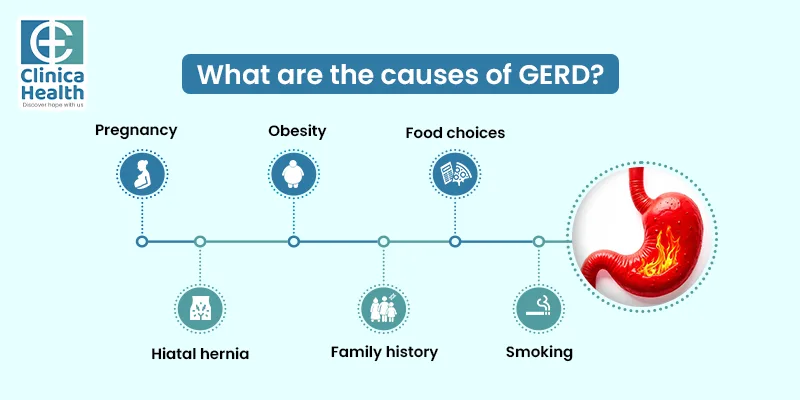GERD – What it Is & Treatment
Are you suffering from constantly throwing up your stomach's acidic contents? In that case, you are suffering from GERD.
Gastroesophageal reflux disease (GERD) is a chronic digestive disorder where the stomach’s contents (both acidic and digestive secretions) flow back into the esophagus. It mainly happens as a result of impaired value between the esophagus and stomach.
While some may opine that GERD is not a serious condition, however chronic acid reflux hinders the quality of life.
Instead, it is a long-term condition and requires GERD treatment surgery to prevent serious health issues.
What happens during GERD?
In normal situations, the lower esophageal sphincter(LES) opens to let the food pass into the stomach and then closes to prevent the food from moving back into the esophagus. However, when an individual suffers from GERD, the valve fails to close properly, causing the stomach’s content to flow back into the esophagus.
This constant coming of the food irritates the esophageal lining, causing inflammation and pain. GERD is estimated to affect both children and adults.
Symptoms of GERD
Individuals with GERD are likely to experience the following symptoms. The signs can either be mild or severe.
Acid regurgitation: Acid or partially digested food from the stomach moves up into the esophagus. This results in a bitter or sour taste in the mouth.
Heartburn: A burning sensation in the chest, especially after eating.
Chest pain: Discomfort that resembles a heart attack
Difficulty in swallowing: A sensation that the food is stuck in the throat.
Chronic cough: It worsens during the night, leading to sleep disturbances.
Hoarseness or sore throat: As a result of constant irritation in the esophagus.
Causes of GERD
There are several factors that make an individual more prone to developing GERD.
Pregnancy: Hormonal changes and increased pressure on the abdomen can cause acid reflux in pregnant women.
Hiatal hernia: It is a condition where part of the stomach comes through the diaphragm, affecting the LES and increasing the risk of GERD.
Obesity: Excessive weight can put pressure on the abdomen, increasing the likelihood of acid reflux.
Family history: If someone in the family, particularly first-degree relatives, there is a high chance of developing GERD.
Food choices: Food choices such as spicy food, caffeine, fatty meals and alcohol is a contributing factor that triggers LES.
Smoking: Constant smoking of tobacco weakens the LES and leads to GERD.

Complications of GERD
GERD treatment surgery is extremely crucial when it comes to getting relief from this condition. If unaddressed for a long time, it can lead to several complications like the following:
Esophageal stricture: The constant scarring from the acid reflux causes the esophagus to narrow, making swallowing extremely difficult.
Barret’s esophagus: Repeated exposure to the stomach’s acidic content permanently damages the lining of the esophagus, increasing the risk of cancer.
Esophagitis: This is inflammation of the esophagus leading to tissue damage or ulcers.
Respiratory problems: GERD often results in asthma-like symptoms such as chronic coughing or pneumonia due to acid aspiration into the lungs.
Diagnosis of GERD
The following are the diagnostic tests which your surgeon performs before GERD treatment surgery.
Barium X-Ray: Here the patient swallows a solution known as barium sulfate. It coats the lining of the upper digestive tract to make it visible on X-ray.
Endoscopy: It involves the insertion of a flexible tube with a camera attached to visualise the stomach, esophagus and duodenum
Esophageal motility study: It involves placing a catheter that contains a sensor to measure the movement and pressure within the esophagus and stomach.
24-hour pH-monitoring: It involves the placement of a small tube having a sensor to monitor the frequency and duration of acid reflux episodes over a time span of 24 hours.
The above tests play an important role in the treatment of GERD. It helps to understand the severity of the symptoms, assess the functioning of the esophagus and to determine the right surgical approach required.
Treatment Options for GERD
The most effective and permanent solution to get relief from the symptoms of GERD is GERD treatment surgery. It aims to strengthen the LES to prevent acid reflux.
During the procedure, the top of the stomach is wrapped around the lower esophagus to prevent the coming up of acidic content. It requires general anesthesia and a shorter hospital stay. Moreover, the recovery period is also of shorter duration.
Medicines: Here are the following medicines that your surgeon might suggest.
- H2-receptor antagonists to reduce the production of stomach acids.
- Proton pump inhibitors reduce the formation of stomach acids and give relief from symptoms such as heartburn, healing the damage caused to the oesophagus.
- Prokinetic agents to ensure that the stomach remains cleared.
Lifestyle modifications:
Lifestyle/dietary changes such as the following:
- Limit intake or avoid having chocolate, peppermint, fatty foods, coffee, and alcohol
- Elevate the head of your bed or raise the upper body with a foam wedge
- Have small, frequent meals instead of one large meal
- Avoid eating or drinking for three to four hours prior to going to bed
- Maintain a healthy body weight
- Limit smoking
Conclusion
GERD is common yet a serious condition. While mild cases can be managed with medications, severe cases require GERD treatment surgery. Whenever you experience any signs, get yourself checked and talk to your healthcare provider ASAP.
 Call Now:
8010 552 552
7595 838 844
Call Now:
8010 552 552
7595 838 844
 Whatsapp Now:
8010 552 552
Whatsapp Now:
8010 552 552
 Email Me:
[email protected]
Email Me:
[email protected]

